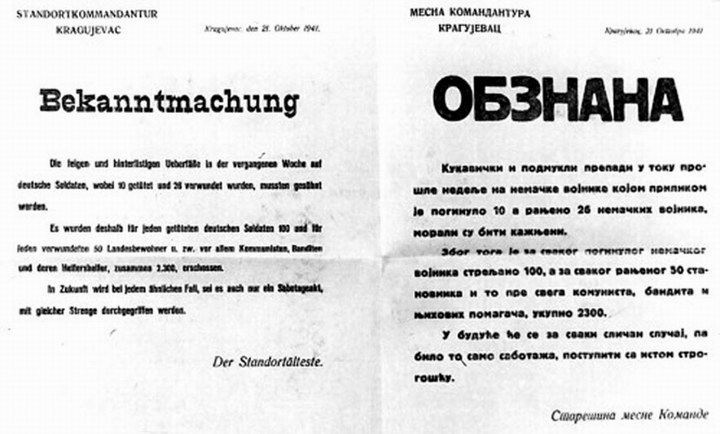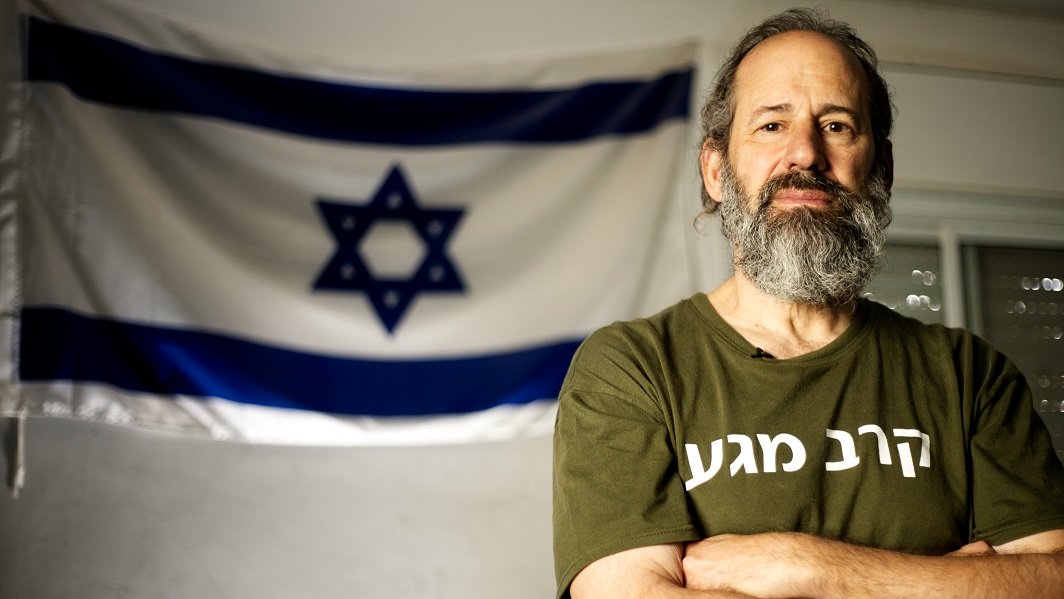- Home
- Krav Maga Blog
- Krav Instructors
- Train in Israel
- Tour Train Israel
- Krav Shop
- DVD
- Kickboxing
- IKI Near Me
- Seminars
- IKI Membership
- On-Line Training
- Krav Maga Training
- Testimonials
- History Krav Maga
- Instructors Page
- Past Blogs
- Spanish
- Italian
- Certification
- Contact
- Holland Seminar
- Vienna Seminar
- Poland Seminar
- Italy Seminar
- Belt Requirements
And Your First Lesson is Free
BY MOSHE KATZ
CEO
ISRAELI KRAV INTERNATIONAL
November 19, 2023, Israel

Not an IKI T shirt, and not an idea that I endorse. (not on the IKI Shop)
A few years ago, one of our participants in the Tour and Train program gave me a gift. This is not unusual as many students bring gifts from their native countries as tokens of appreciation. But this one was a mug, usually a good idea, but it said on one side "I am a Krav Maga instructor", and on the other side "Touch me and your first lesson is free".
I said thank you, but that anyone who wants it can take it. I did not want it.
Years ago, at parties, friends would introduce me in this manner, "This is my friend Moshe Katz, he is a karate black belt", and then I would hear the usual snicker and laughter, "Ohh...we better not piss him off".
What was the implication? Moshe is a black belt in karate, or whatever, he 1. Knows how to fight, 2. Can easily hurt others, and 3. If we upset him, he will beat us up, so we had better be careful.
While the first two may be true, the third point is highly insulting. I am not such a hot head that if you insult me, I will beat the crap out of you. In my entire life that has never happened. I am not a brute street thug; I am an intelligent mature human being. And that is why I do not like the mug with the "Touch me etc.." No, if you touch me, I will not explode and beat you up, i.e. first Krav Maga lesson is free. While I understand that the T shirt is a joke, and meant to be funny, I prefer not to have such a T shirt or mug. If you want a free lesson, OK, but there is no need to touch me. and no, I am not so hotheaded and volatile that I will have a temper tantrum if you touch me.
Now let's make a comparison with the current situation in Israel and then take it right back to Krav Maga. As of this writing Israel is involved in a war with the Arab population of the region of Gaza. I don't like to use the term "conflict" as that seems to imply some sort of legitimate dispute. The way I see it, the "conflict" is we want to live here, and they don't want us to live here, and they will continue attacking us until we are all dead or forced to leave. As we wish to live this creates a certain conflict of interest.
Now after the crimes against humanity on October 7, 2023, which are documented internationally beyond any dispute, Israel decided to take actions to make sure this would never happen again. Some around the world have referred to Israel's counterattack as "Collective Punishment". I just love it when people throw around mindless propaganda slogans, such as "Collective Punishment". I want to explain here briefly why that is not the case, should not be the case, and is something we avoid in Krav Maga.

Nazi Germany announcement of the killing of 2,300 civilians in the Kragujevac massacre, as retaliation for 10 German soldiers killed by Yugoslav Partisans in Nazi-occupied Serbia, 1941
Let us ask, what is collective punishment? First let us ask, what is a punishment and what is its' purpose? Sometimes punishment is thought of as a way of "teaching the guy a lesson", but more often than not, it is just to punish, i.e. we are angry at this person, and we feel he should pay a price. Sometimes a punishment might serve as a deterrent against repeating these negative actions, sometimes it can be a detterent to others, but is that really our purpose?
If that were our purpose, we would study cases to see if the punishment really had that effect, but usually, we simply don't care. i.e. we put a person in jail because they deserve it, even if we know it is no deterrent at all. These days we speak less of punishment, and more of "consequences", i.e. your consequence of not studying for the exam is that you failed, the consequence of fooling around in high school is you will not get a good job, that is punishment enough. The difference is that if want to teach about consequences, rather than punishment, it is to be immediate so that the person feels the connection. I.e. if you committed fraud in the stock market and a year later go to jail, that is different from hitting a child and being immediately suspended from school.
Now let us look at Israel. Israel tried over many years, in many different ways, to solve the problem with Gaza. I will not go into all those attempts, that could be several books worth of material. but it involved the carrot and the stick, offering benefits when they did not attack us, and doing surgical military responses when there was no other choice. Finally push came to shove with this brutal surprise attack on October 7, 2023, with 1,400 people slaughtered, unarmed in their homes, rapes and other crimes too hideous to describe now. Israel said, enough is enough.
But did they go out to punish Gaza? No. Did they go out to punish Hamas? Again, here as well, the answer is a clear and unequivocal and resounding No. What Israel set out to do was to destroy Hamas as a military threat so that this does not happen again. How is that different from punishment? Punishment is out of spite; but our case is a clearly thought-out process to prevent them from having the ability to do this again. Soldiers are not permitted to vent their anger and kill randomly, everything is strictly controlled, and international journalists are invited to be there. The goal is a surgical response, find the terrorists and destroy them. Find the homes of the leaders and destroy them. This does not meet the definition of punishment, it is an act to protect the citizens of Israel from a repeat of the events of October 7, which Hamas has openly vowed to repeat.
So it is not a punishment, that much is clear. Now let us look at the accusation of "collective punishment."
2,300 Yugoslav citizens who were not members of the resistance and had nothing to do with the killing of German soldiers, being killed as a collective punishment, that indeed fits the description. Of course, the resistance was legitimate, and the killing of Reinhard Heydrich was deserved, he was after the architect of the Holocaust. The German decision to randomly choose 2,300 Yugoslav citizens without even trying to connect them to the killings of Germans, was clearly a fine example of collective punishment. What is happening in Israel, is not.
First, as I already explained, it is not a punishment at all but a means of protecting the people of Israel, which is, after all, the responsibility of the government. The government failed in its responsibility on October 7, 2023, and allowed its citizens to be murdered. What Israel is doing now is simply restoring the confidence to the people and guaranteeing them that the government is doing their job, i.e. the task of any government, the protection of its people. It is not about punishing the enemy; it is about protecting the people. There is a massive difference.
But would this fit the definition of Collective Punishment?
Collective punishment is a punishment or sanction imposed on a group for acts allegedly perpetrated by a member of that group, which could be an ethnic or political group, or just the family, friends and neighbors of the perpetrator. Because individuals who are not responsible for the acts are targeted, collective punishment is not compatible with the basic principle of individual responsibility. The punished group may often have no direct association with the perpetrator other than living in the same area and can not be assumed to exercise control over the perpetrator's actions. Collective punishment is a war crime prohibited by treaty in both international and non-international armed conflicts, more specifically Common Article 33 of the Fourth Geneva Convention and Article 4 of the Additional Protocol II.
In our case there has been no punishment imposed on any group. There have been attacks, specifically targeting military targets. However, being that Hamas has built their military bases into residential neighborhoods including hospitals, schools, kindergartens and of course residential buildings, it becomes very difficult to prevent accidental civilian casualties. But Israel has gone above and beyond the call of duty, it has given up the advantage of any surprise by publicly announcing when and where they would attack. They have asked the Gazan civilian population to evacuate the war zone. Now should you say, How dare they? Well, Israel did the same with its own population, over a quarter of a million Israelis have been evacuated from the war zone, entire regions have been emptied of their civilian populations, schools around the country have been turned into residences for displaced families.
That is simply the nature of war. The same was done in England during the Second World War, children were evacuated to the countryside, far from the cities which were being bombed. No one said war was pleasant.
Collective punishment would imply seeking out a group to punish and punishing them. This was not done. If there is a gang fight and you happen to be there, and shots are exchanged, and you get hit, that is not punishment, that is being in the wrong place at the wrong time when you should have known better. If one studies Israeli history, one will understand that collective punishment has never been used in Israel. For example, if a terrorist from Hebron commits an attack he and he alone will pay for his crimes. The other day three residents of Hebron set out to commit a massacre in Jerusalem, they did not succeed. Was there an attack on Hebron? No, were there sanctions imposed upon the entire city of Hebron? None whatsoever. Study the sources, there has never been collective punishement in Israel.
And now back to Krav Maga and the mug that I did not like. When we are attacked, we do not go ballistic. Our goal is defense, self-defense and defense of others. Our response is not emotional, thus I don't like the "Touch me and your first lesson is free", i.e. touch me and I will have a temper tantrum. No, our response is controlled, trained. We train how to respond correctly. Anger is not a good resonse as the old Samurai saying, "Anger defeats a man on and off the matt."
We do not respond with anger; we do not respond with emotion. We respond, like the Israeli army, in a way that prevents the enemy from hurting us again. If it is a gun disarm or a knife defense, it is a response based on our training. Our goal is not to punish the attacker but to make sure he cannot hurt us. There is a difference.

Moshe Katz, 7th dan Black Belt, Israeli Krav Maga. Certified by Wingate Institute. Member Black Belt hall of fame, USA and Europe.
Understand the Israeli Fighting Mentality - Israel a Nation of Warriors by Moshe Katz

What is the cultural background of Krav Maga? What makes it unique? What makes the Israeli military so effective? Why are Israeli security systems used all over the world?
What are the Biblical origins of Krav Maga and who was the first Krav Maga instructor?
What weapons and military strategies did our Biblical ancestors use?
How has Krav Maga developed in Israel and what are its goals?
All that and more in this unique book.
Start Your REAL Training TODAY
Or is someone coming to save you?
IKI Krav Maga online distance training - Leading to ranks and certification.
Tour and Train Israel Experience
Personal Training - If you are interested in personal Krav Maga training please contact us on the form below.
